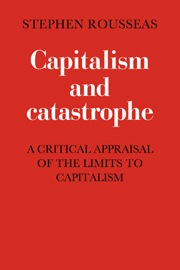Book contents
3 - The limitless accumulation of capital in postcapitalist society
Published online by Cambridge University Press: 05 November 2011
Summary
One question remains to complete Rosa Luxemburg's analysis of the accumulation of capital. Assume we not only escape the ‘barbarism’ she so feared, but that somehow we also manage to achieve a true supersession of capitalism. That the Soviet Union is not a true supersession hardly requires argument. As early as 1932, in reviewing Marx's youthful 1844 Paris Manuscripts, Herbert Marcuse characterized the Soviet Union as a system that had only replaced private property with ‘universal’ private property, a crude form of communism that was “merely the simple ‘negation’ of capitalism and as such exists on the same level as capitalism.” In the terminology of the young Marx, Soviet labor is therefore just as ‘alienated’ and ‘estranged’ as capitalist labor; indeed, the Soviet Union is simply another form of capitalism. A more recent blast, along similar lines, came upon the promulgation, with much fanfare, of the Soviet Union's new Constitution on June 4, 1977. China referred to it as a “fig leaf” to cover the betrayal of the proletariat by “a handful of bureaucrat-monopolist capitalists,” a “cabal of revisionist renegades” who have usurped the proletariat and revived capitalism. From the Chinese point of view, the Soviet Union is a “bureaucrat-monopoly” version of the capitalist system where “the rich get richer and the poor poorer and class antagonism gets more pronounced than ever.” A few days later they reminded Brezhnev, who has a vast collection of capitalist cars, of the fate of Louis XVI.
- Type
- Chapter
- Information
- Capitalism and Catastrophe , pp. 33 - 46Publisher: Cambridge University PressPrint publication year: 1979



